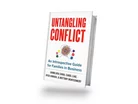Business Chief Book Club: Easing conflict in family business

‘Peace is not the absence of conflict, but the ability to cope with it.’ Mahatma Gandhi’s decades-old words are the premise for a new and thoughtful book from Boston Consulting Group BCG, exploring the complicated world of family businesses.
Based on the premise that family businesses are more likely to throw up internal disputes, Untangling Conflict: An Introspective Guide for Families in Business delivers an invaluable reference manual for all family business leaders looking for better ways to deal with intra-family clashes.
Rather than telling leaders exactly how to mitigate conflict, BCG APAC authors Janmejaya Sinha, Carol Liao, Ryoji Kimura, and Brittany Montgomery draw on their long-time experience working in corporate strategy and with family business dynamics to deliver a guide that “enables families to discover the answers for themselves”, says Janmejaya Sinha, Chairman of BCG’s India Practice.
The book does this by posing questions that get past family business leaders’ “deeply held assumptions and provoke the uncomfortable conversations they must have before conflicts arise – or get worse.”
According to Ryoji Kimura, Global Leader of BCG’s Corporate Finance & Strategy practice, “it’s essential for the long-term health of any family business to identify the most damaging patterns of contention so those conflicts can be addressed”.
8 in 10 businesses globally are family owned – prevalent in emerging markets
It’s an important issue that is seldom addressed, and one that is likely to garner a large audience given the extent of family business activity.
According to International Finance Corporation (IFC) data, 80% of businesses globally are family owned. In emerging markets, family businesses represent the largest source of private sector job creation and the majority of micro-, small-, and medium-sized enterprises.
Some 300 of the top 500 revenue-generating businesses in India and South Korea belong to families, whereas in the US and the UK, only about 7% of the top 500 businesses are family owned.
Threads of conflict and issues addressed
Untangling Conflict begins with thoughtful guidance that helps family business leaders reflect deeply on the defining attributes of their family and their relationship with the business.
It then untangles the messy threads of conflict within family businesses by examining issues fraught with emotion – those related to the rights, benefits, and restrictions of ownership, and issues of business strategy. By exploring those three threads of conflict, our intention is to help families understand, prevent, and respond to disagreements without disrupting the business,” says Liao, a senior partner and chair of BCG in Greater China.
The issues addressed are many, from intergenerational disputes between ‘elder statemens’ founders and their overseas-educated children, to fights over roles for in-laws and non-family members. Among the most serious of all clashes, say the authors, are those over values – between a profit-minded leader and a family member who places a premium on environmental causes, for example.
The book closes by offering tools to align expectations and reduce friction among families, non-family employees, and the partners of family-owned businesses.
Untangling Conflict is published by Penguin Enterprise. Printed copies can be purchased here
- BCG: 10 lessons learned from 20 years of M&A analysisCorporate Finance
- Business succession: early planning key to positive disposalLeadership & Strategy
- Daniel Weise of BCG on new supply chain and procurement bookLeadership & Strategy
- BCG: Strategy tips for your C-suite cheat sheet in 2022Leadership & Strategy



